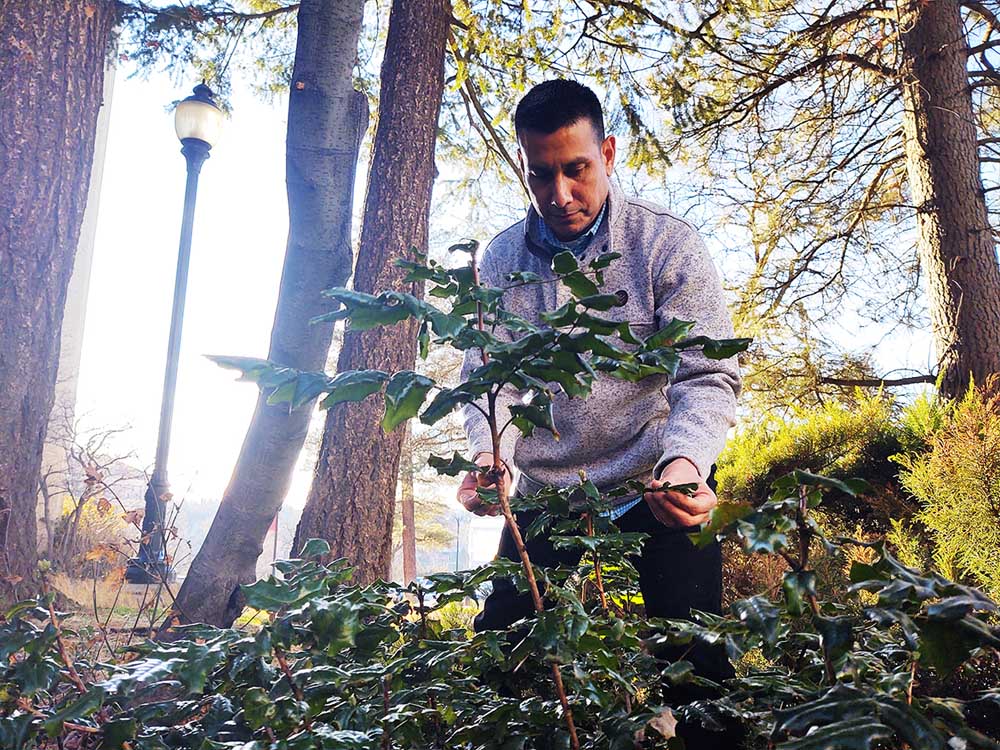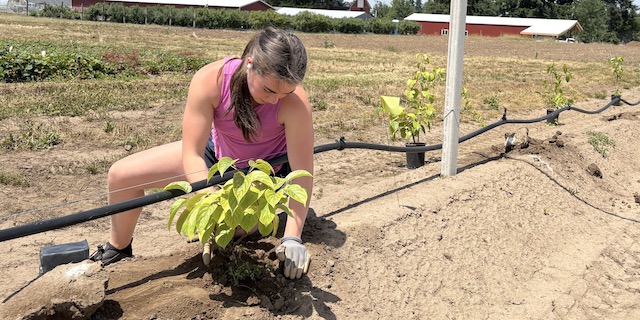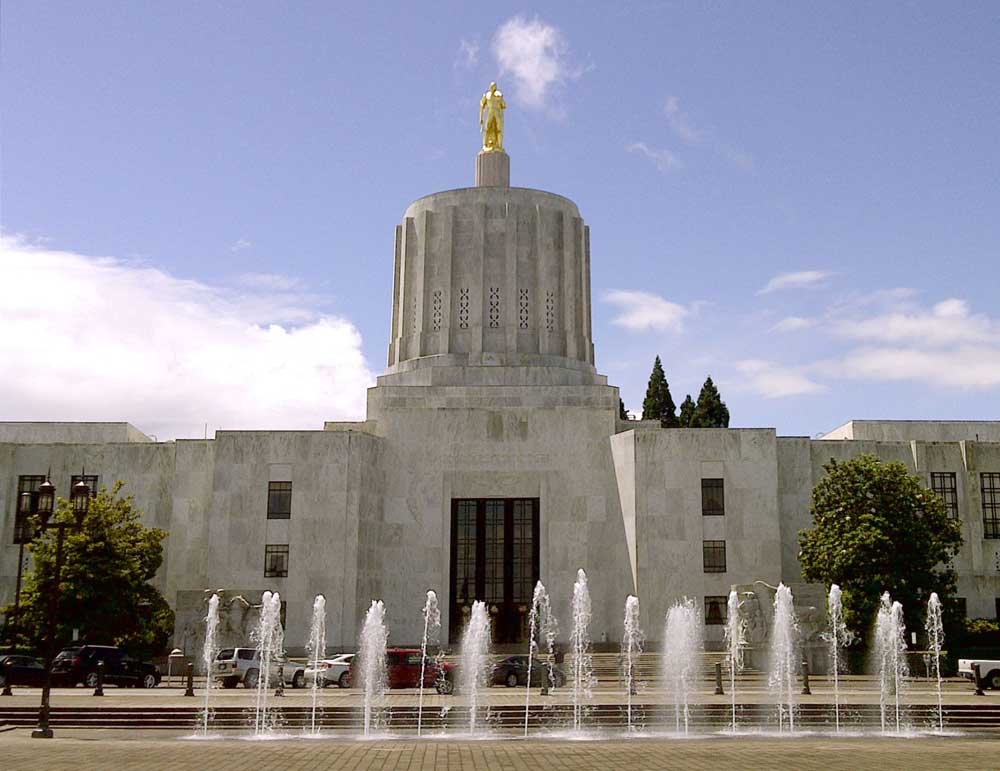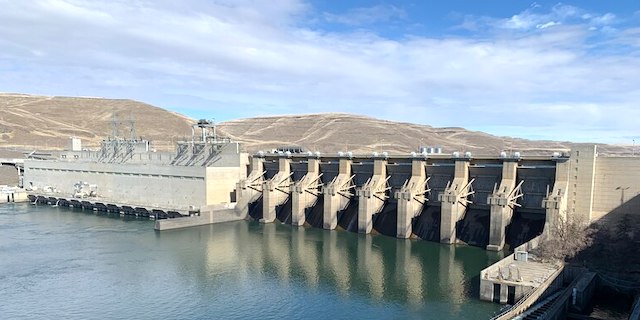Western Innovator: Teaching Native American food systems
Published 5:45 pm Tuesday, December 17, 2024

- Landon Charlo, associate professor of Native American food systems at Washington State University, will teach undergraduate and graduate courses from a Tribal perspective.
PULLMAN, Wash. — Landon Charlo is an assistant professor of Native American food systems at Washington State University.
It’s a brand-new position at WSU.
“I’ve really been feeling like an entrepreneur, as far as building something from the ground up,” Charlo said. “It’s been really exciting.”
Charlo is an enrolled member of the Confederated Salish and Kootenai Tribes of Montana.
He will teach an undergraduate Native American food systems course, and a graduate-level course titled “Native Science, Tribal Environmental Policy and Collaboration.”
Both classes are taught from a Tribal perspective, and intended for Tribal and non-Tribal students in WSU’s School of the Environment or related departments, Charlo said. There are few Native American students at WSU, particularly in those programs, he said.
“The collaboration component is really to help a lot of future scientists who are non-Tribal, who are going to work with Tribal communities and Tribal governments,” he said.
In recent years, WSU has hired more Native American faculty members, Charlo said.
“One of the biggest needs is for Indigenous-focused courses to be taught by Indigenous faculty, just because there is that knowledge and upbringing of culture that you really can only experience by actually living and participating within Tribal communities,” he said.
Charlo is recruiting students from various academic backgrounds who are interested in working with Native American food systems and making a positive impact in Tribal communities.
Traditional foods
Growing up, Charlo participated in traditional food harvests — hunting, fishing and collecting wild roots and berries. He also worked as a USDA biological science technician for several years, studying cool season food legumes.
For non-Tribal students, Charlo hopes to provide a glimpse of Native American culture.
“I’ve seen this explosion of interest in Indigenous knowledge, whether that’s by scientists or the general public,” he said.
He hopes his students leave his courses with the idea that there are many different ways to produce food and identify wild, nutritious foods.
“I’m not against modern agriculture, but I definitely am very much promoting the way that Tribes gathered, collected and had reverence for their traditional foods,” he said.
His approach will include permaculture, agro-forestry and managing forests for food production, he said.
Tribal collaborations
“Hopefully, Landon’s work will help connect Tribes and Tribal members with the larger agriculture industry,” said Linda McLean, director of WSU Extension on the Colville Reservation. “As much of our Tribal foods and medicines are grown naturally in the wild, it is so important for non-Tribal and off-reservation landowners to understand the cultural practices of Tribal peoples digging and gathering these foods.”
Many of the foods and medicines grow on private and state lands, McLean said.
Through his work, Charlo can help increase access to the important cultural foods and ultimately even increase plant populations for better access and availability, she said.
Charlo will rely heavily on those who are and those who have been working in native food systems, McLean said.
“With 29 federally recognized Tribes in Washington, nine in Oregon and five in Idaho, this may seem like a daunting task,” she said. “Landon is energetic and willing to learn anything and everything about native foods and cultural practices surrounding food.”
“I am jumping with joy at Landon’s calm and thoughtful approach to the endless requests he is now facing from potential collaborators. … I’m elated,” said Tracy Morgan, program coordinator for WSU’s Federally Recognized Tribal Extension Program for the Kalispel Tribe.
She hopes Charlo can help restore native foods to the reservation diet, address food access disparities, find solutions for food production and storage, raise produce and wild foods and bring “Indigenous genius, ethic and resilience to the academic approach.”
“He already has given the regional Tribes great hope and optimism that the university and academic community can step up and hire Native American faculty and research leadership that reflect the demographics and unique needs only someone from that group can know,” Morgan said. “He will also educate the non-native communities in techniques and paradigms that are refreshing and unique, and are sorely needed in this time of change.”
Food sovereignty
Native American food sovereignty is largely the right of Tribal communities to define their own food system, Charlo said.
“Even though I’m Native American, I still consider myself an outside researcher with most of the Tribal communities I work with,” he said. “It’s not so much about what I think should be moving forward, but it’s more along the lines of partnering with Tribes and helping them develop the food systems that they really want to see grow.”
Generally, Tribes are interested in reviving traditional First Foods, such as camas — a bulb that is an important carbohydrate staple for many Tribes — salmon, bison and huckleberries, he said. They’re also interested in community gardening or increasing family gardens.
“I consider myself a community-based researcher,” Charlo said. “My approach is to first develop relationships and get to know Tribal communities, get to know projects around food that they’re interested in.”
Landon Charlo
Age: 46
Title: Assistant professor of Native American food systems, Washington State University
Hometowns: Arlee, Mont., and Umatilla, Ore.
Current location: Pullman, Wash.
Education: Ph.D. in educational psychology at WSU
Family: Single.
Hobbies: Hunting and fishing, cut firewood, playing piano, spending time with friends and family.
Website: https://environment.wsu.edu/landon-charlo/






